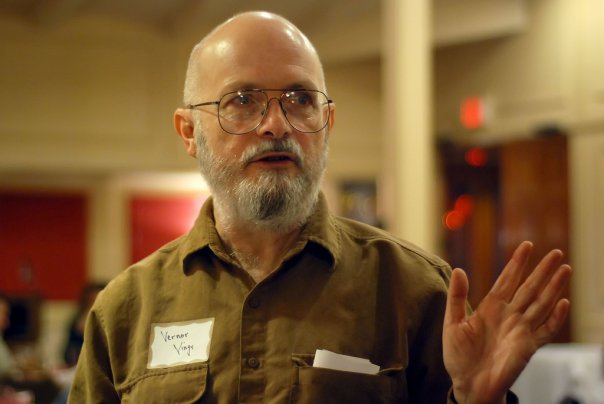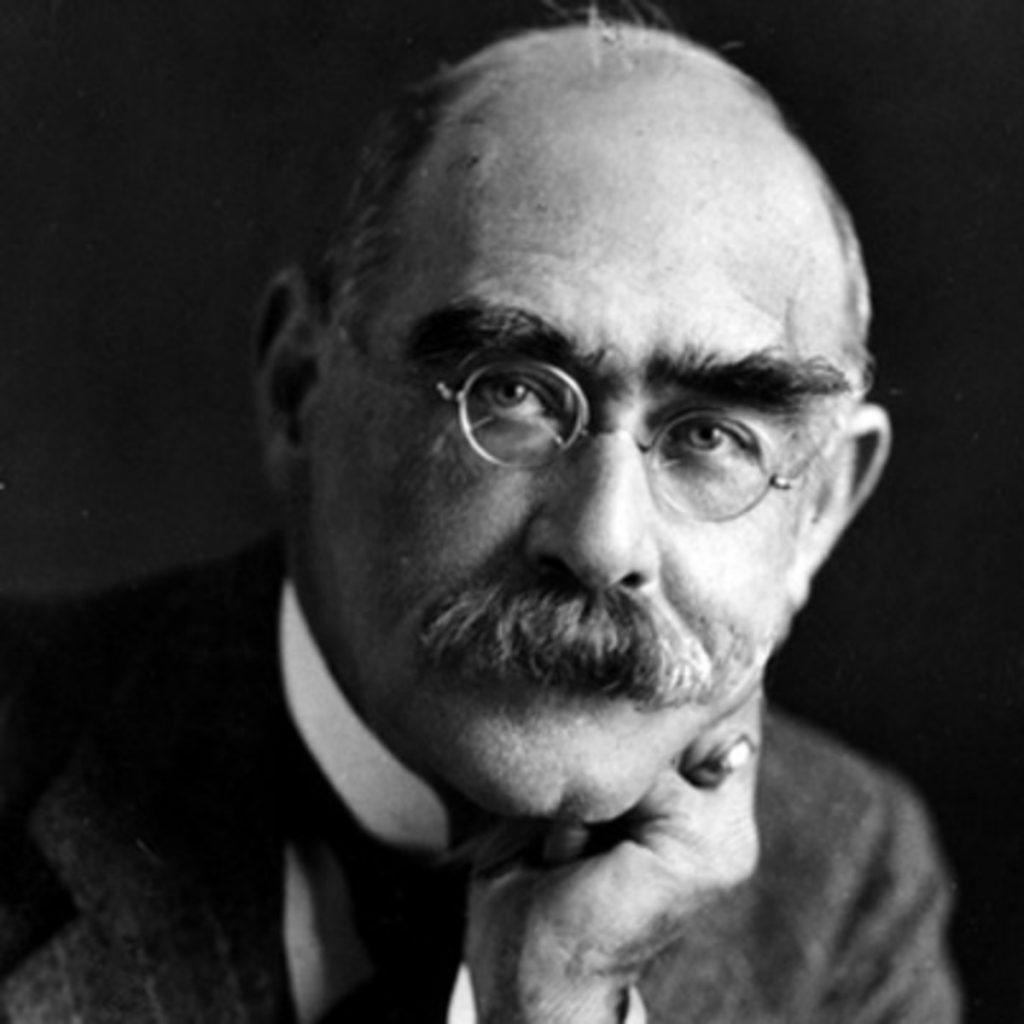
Poul Anderson 
Kurt Vonnegut 
Vernor Vinge 
Robert Anton Wilson 
Rudyard Kipling
The Libertarian Futurist Society has selected five finalists for the 2019 Prometheus Hall of Fame Award.
- “As Easy as A.B.C.,” by Rudyard Kipling (first published 1912 in London Magazine), the second of his “airship utopia” stories, envisions a twenty-first century world founded on free travel, the rule of law, and an inherited abhorrence of crowds. Officials of the Aerial Board of Control are summoned to the remote town of Chicago, which is convulsed by a small group’s demands for revival of the nearly forgotten institution of democracy.
- “Sam Hall,” a short story by Poul Anderson (first published 1953 in Astounding Science Fiction): A story set in a security-obsessed United States, where computerized record-keeping enables the creation of a panopticon society. The insertion of a false record into the system leads to unintended consequences. Anderson, the first sf author to be honored with a Special Prometheus Award for Lifetime Achievement, explores political implications of computer technology that now, decades later, are widely recognized.
- “Harrison Bergeron,” by Kurt Vonnegut (first published 1961 in the Magazine of Fantasy and Science Fiction), a dystopian short story, set in a United States where constitutional amendments and a Handicapper General mandate that no one can be stupider, uglier, weaker, slower (or better) than anyone else, satirizes the authoritarian consequences of radical egalitarianism taken to an extreme that denies individuality and diversity. Vonnegut dramatizes the destruction of people’s lives and talents and the obliteration of basic humanity via a denial of emotions and knowledge that leaves parents unable to mourn a son’s death.
- “Conquest by Default,” by Vernor Vinge (first published 1968 in Analog), Vinge’s first exploration of anarchism, offers a story about human civilization being overwhelmed by a superior alien force, told from the point of view of an alien sympathetic to the underdogs, who finds a way to save the humans by breaking up governments into much smaller components. The alien culture uses a legal twist to foster extreme cultural diversity, as characters draw explicit parallels between the plight of humanity in the face of superior alien tech and the fate of Native Americans faced with European invaders.
- Schrödinger’s Cat: The Universe Next Door, by Robert Anton Wilson (first published 1979 by Pocket Books), a parallel-worlds novel, draws upon theories from quantum mechanics to explore themes about the evil of violence, particularly political coercion and the carnage of the Vietnam War. The speculative fantasy features alternate versions of characters from the Illuminatus! trilogy by Wilson and Robert Shea, which won the Hall of Fame Award in 1986.
In addition to these nominees, the Hall of Fame Committee considered nine other works: “The Man Who Sold the Stars,” by Gregory Benford; “ILU-486,” by Amanda Ching; The Mirror Maze, by James P. Hogan; That Hideous Strength, by C.S. Lewis; A Mirror for Observers, by Edgar Pangborn; A Time of Changes, by Robert Silverberg; Demon and Freedom, by Daniel Suarez, as a combined nomination; The Once and Future King and The Book of Merlyn, by T.H. White, as a combined nomination; and “Even the Queen,” by Connie Willis.
The LFS says the purpose of the Prometheus Awards is to recognize
…outstanding works of science fiction and fantasy that dramatize the perennial conflict between Liberty and Power, favor private social cooperation over legalized coercion, expose abuses and excesses of obtrusive government, critique or satirize authoritarian ideas, or champion individual rights and freedoms as the mutually respectful foundation for peace, prosperity, progress, justice, tolerance, mutual respect, and civilization itself.
The final vote will take place in mid-2019. All Libertarian Futurist Society members are eligible to vote. The award will be presented at the Dublin Worldcon.
Nominations for the 2019 Hall of Fame Award can be submitted to committee chair William H. Stoddard ([email protected]) at any time. All LFS members are eligible to nominate. Nominees may be in any narrative or dramatic form, including prose fiction, stage plays, film, television, other video, graphic novels, song lyrics, or epic or narrative verse; they must explore themes relevant to libertarianism and must be science fiction, fantasy, or related genres.
The Libertarian Futurist Society also presents the annual Prometheus Award for Best Novel. More information is available at their website, www.lfs.org.
Discover more from File 770
Subscribe to get the latest posts sent to your email.

Fun to see them nominating Kurt Vonnegut, mostly known for his socialist views.
And Pangborn — not as Socialist, but out of patience with the I-did-it-all-myself individualist school. I was surprised at that specific nomination; I wonder whether somebody thought its espousal of gentle guidance rather than outright dominance made it worthwhile, even if the Good Guys were treading on (IIRC) “No Truce with Kings” territory.
And the Kiplingks funny in it’s own special way. According to isfdb this is As Easy as A B C’s 14th consecutive nomination without a win.
@Hampus:
Years ago, Iain Banks and Ken MacLeod won the Prometheus frequently enough that , some fans were calling it “the Prometheus Award for best Scottish Socialist SF.” I think the people who created the award wanted to celebrate anarcho-capitalist works, but the actual award ranges more widely, and I admire them for the broader definition.
The seeming randomness of the “hall of fame” awards, and how often that one Kipling turns up, are odd. The latter suggests a rule limiting how many times a work can be on the ballot.
Also, I love the Pangborn and hope this gets it a bit more attention, whether or not it wins.
@Hampus Eckerman: “Kurt Vonnegut, mostly known for his socialist views.”
If he’s mostly known for anything (aside from writing), it’s his pacifist views, as doctrinaire as he gets on anything. His socialism is important but not primary.
@Vicki Rosenzweig: “I admire them for the broader definition.”
Me, too. It’s nice for those of us who seek liberty via the left to have one more hospitable environment.
I wonder what Robert Anton Wilson would make of all this? He was, at least as far as I could tell, a famously anti-cultural kind of guy. I met him a few times, and heard him speak, at a bunch of neo-pagan events in the 80’s in the Midwest, and he was truly unique. He was capable of making a 45 minute talk start with Johnny Carson’s alleged high-grade weed, move through Bugs Bunny, the 23 enigma and alien consciousnesses, veer through the derangement of the senses as practiced by Rimbaud, drop a note about Baudrillard, and then end up with a perfectly timed punchline about Johhny’s pot. He was seriously out there. I would have loved to have seen him in a room with Sun Ra.
It’s worth noting that L. Neil Smith, who essentially created the award, had a character in The Probability Broach who was the widow of Pyotr Kropotkin, one of the best-known communist anarchists. So that “broader definition” isn’t all that much of a novelty.
However, Iain Banks has never won a Prometheus Award. The Scottish socialists who have won it are Ken MacLeod and Charles Stross; the joke about that was made by Stross in his acceptance speech for Glasshouse.
I wrote about the broader question on our blog last August (http://lfs.org/blog/what-do-you-mean-libertarian/), if you want to see a discussion of what we think we’re doing with the award.
Pingback: Finalistas para el Prometheus Hall of Fame – Fantástica – Ficción